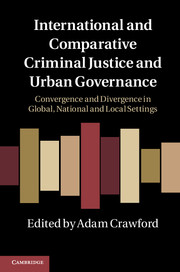 International and Comparative Criminal Justice and Urban Governance
International and Comparative Criminal Justice and Urban Governance Book contents
- Frontmatter
- Contents
- List of figures
- List of tables
- Notes on contributors
- Acknowledgements
- 1 International and comparative criminal justice and urban governance
- PART 1 International criminal justice
- PART 2 Comparative penal policies
- 8 Penal comparisons: puzzling relations
- 9 Why globalisation doesn't spell convergence: models of institutional variation and the comparative political economy of punishment
- 10 Penal excess and penal exceptionalism: welfare and imprisonment in Anglophone and Scandinavian societies
- 11 The impact of multi-level governance on crime control and punishment
- 12 Explaining Canada's imprisonment rate: the inadequacy of simple explanations
- 13 US youth justice policy transfer in Canada: we'll take the symbols but not the substance
- 14 Liberty, equality and justice: democratic culture and punishment
- PART 3 Comparative crime control and urban governance
- Index
- References
12 - Explaining Canada's imprisonment rate: the inadequacy of simple explanations
from PART 2 - Comparative penal policies
Published online by Cambridge University Press: 05 June 2011
- Frontmatter
- Contents
- List of figures
- List of tables
- Notes on contributors
- Acknowledgements
- 1 International and comparative criminal justice and urban governance
- PART 1 International criminal justice
- PART 2 Comparative penal policies
- 8 Penal comparisons: puzzling relations
- 9 Why globalisation doesn't spell convergence: models of institutional variation and the comparative political economy of punishment
- 10 Penal excess and penal exceptionalism: welfare and imprisonment in Anglophone and Scandinavian societies
- 11 The impact of multi-level governance on crime control and punishment
- 12 Explaining Canada's imprisonment rate: the inadequacy of simple explanations
- 13 US youth justice policy transfer in Canada: we'll take the symbols but not the substance
- 14 Liberty, equality and justice: democratic culture and punishment
- PART 3 Comparative crime control and urban governance
- Index
- References
Summary
Introduction
Canada does not fit easily into the typology of political economies and their penal tendencies proposed by Cavadino and Dignan (2006a; 2006b). Based on a study of penal systems in twelve contemporary capitalist countries (not including Canada), these scholars demonstrate a relationship between a nation's political economy on the one hand and the punitiveness of its penal culture (particularly as expressed by its rate of imprisonment) on the other hand. Indeed, they suggest that certain political regimes (e.g. neoliberalism, conservative corporatism, etc.) have distinct penal landscapes (i.e. more or less punitive penal policies).
In terms of penal policies, most observers would probably assume that Canada would fit neatly within those nations described as having political economies and penal tendencies that could be categorised as neoliberal. This placement would certainly seem obvious given geographic, economic and cultural proximity to the country highlighted by Cavadino and Dignan as the ‘archetypical example’ of this group (USA). In addition, it would seem natural that Canada would be grouped with the ‘other examples’ of the neoliberal political economy listed by these scholars – England and Wales, Australia, New Zealand and South Africa – given their historical (e.g. as members of the Commonwealth) and institutional (similar legal systems) ties.
- Type
- Chapter
- Information
- International and Comparative Criminal Justice and Urban GovernanceConvergence and Divergence in Global, National and Local Settings, pp. 304 - 330Publisher: Cambridge University PressPrint publication year: 2011
References
- 2
- Cited by
